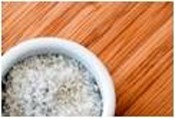Sodium is both an electrolyte and a mineral. It helps maintain water balance, both inside and outside the body's cells, and plays many other very important roles in your body. If sodium is so important for the body to function properly, why is there so much talk about reducing sodium in our diet?
On average, a higher sodium intake can be associated with a high risk for blood pressure. High blood pressure (hypertension) can lead to heart disease if not treated properly.
If you’ve been told that you have pre-hypertension, this should be seen as a red flag to start making lifestyle changes. Pre-hypertension means that although you do not have high blood pressure now, you are likely to develop it in the future if you don’t make any diet and lifestyle changes. More than 37 percent of adult Americans have pre-hypertension.
What can you do to help control your blood pressure? Here are a couple of lifestyle changes to consider:
- Maintain a healthy weight.
- Be physically active.
- Follow a healthy eating plan.
- Drink alcohol only in moderation.
- Quit smoking.
- Follow any specific doctor’s orders.
A Dietary Approach to Reduce Hypertension
DASH stands for ‘Dietary Approaches to Stop Hypertension’. The DASH diet is designed to make sure you get the right amount of certain minerals--potassium, magnesium, and calcium--that are key to lowering your blood pressure. The DASH diet encourages an increase in the consumption of whole grains, fruits, vegetables and low fat milk products. To find out more about hypertension, pre-hypertension, and the DASH diet, go to: http://www.nhlbi.nih.gov/health/public/heart/hbp/dash/new_dash.pdf







